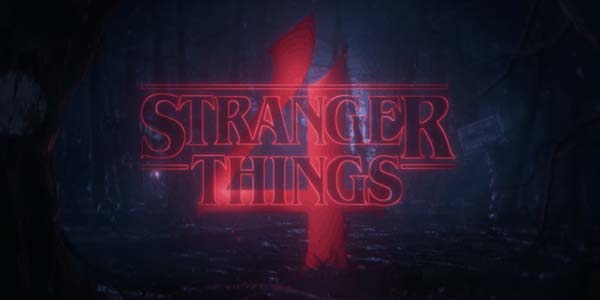
I never bothered reviewing the 3rd season of Stranger Things because I didn't really have strong feelings about it one way or the other. Season 3 was a bit of an improvement over season 2, but both were a resounding "meh" for me. The first half of season 4 is also kind of "meh", but I think that it's worth talking about this time around because it both succeeds tremendously where seasons 2 and 3 failed, but also then kind of ruins any goodwill that it had built up.
The fundamental problem that I have with Stranger Things after the first season is that a continuation of this same story simply doesn't need to happen. The first season worked so well, in large part, because of its intriguing mysteries. Aside from sequel bait, all the important questions and mysteries of season 1 were solved, and the first season felt satisfactorily resolved. If this show was going to have sequel seasons, then I think a more anthology-like approach would have been more appropriate, with each new season telling a new story, with new characters, confronting a completely new and unrelated horror, and solving completely new and unrelated mysteries.
By continuing with the same story, the audience gets to bring everything we know from the first season into the new story. Even though seasons 2 and 3 went in their own directions and took different inspirations compared to the first season (season 1 being kind of Twin Peaks meets E.T., season 2 being inspired by Aliens and Terminator, and season 3 being a play on a Body-Snatchers concepts), neither season 2 nor 3 introduced anything tremendously new. There wasn't much mystery because the workings of the Upside Down, the mechanics of the demogorgons, and the machinations of the secret government labs were all established. Season 3 shakes things up a bit with a body-snatchers plot and an ending that actually destroys the status quo and moves our characters forward with their lives, and is perhaps the only reason that season 3 did not feel quite as stale (for me) as season 2 did. But the fundamental problem was still the same: we've seen all this before, more or less.
Season 4's "monster of the week" approach feels fresh and new.
This is where season 4 kind of shines. It's new monster, Vecna, isn't just another demogorgon. He's something that feels completely new and threatening. His motivations are unknown, and despite being explicitly inspired by Freddy Krueger, the mechanics by which he operates are completely new compared to the previous monsters. This finally gives our characters an actual mystery to solve. For the first time since season 1, the threat of Stranger Things is finally mysterious and unknown again. [More]
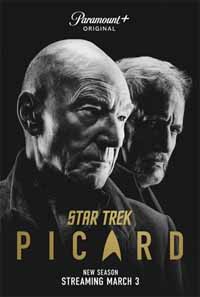 © CBS, Paramount
© CBS, Paramount
I'm not going to wait till the end of the review this time to say this. I want to get it out of the way right up front. Paramount needs to get some actual science fiction writers (preferably ones who have worked on Star Trek in the past) and science and technical consultants into the writing rooms for their Star Trek shows. And furthermore, the TV writers in the room need to listen to those sci-fi writers and consultants. Not only does the second season of Star Trek: Picard fall apart due to sloppy, incoherent plotting, but it also seems painfully unaware of certain parts of Trek canon and also of how metaphor and allegory are supposed to work.
I previously wrote an outline of my ideas for re-writing the first season of Picard to retain all the good ideas, get rid of the bad, and create something that more closely resembles the type of Star Trek that I want to see. But I don't think I can do that for this season of Picard because nothing in this show makes any sense.
I was actually kind of optimistic at the start. The first 2 episodes were actually not bad, and seemed to go out of their way to try to rectify some of the complaints that were levied against season 1. This time around, the Federation is not depicted as racist cowards who are unwilling to help a refugee population fleeing from a natural catastrophe. In fact, they give long speeches about the duty of Starfleet to explore the unknown and about the value of diversity and inclusion. We still see a version of the Federation that is racist and xenophobic, but this time, it's in the form of a parallel reality fascist Confederation. The first episode is even about a starship investigating a strange anomaly in space. This is an OK start. This actually kind of sort of looks like Star Trek.
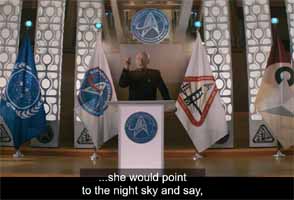 © CBS, Paramount
© CBS, Paramount
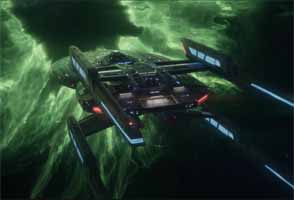 © CBS, Paramount
© CBS, Paramount
Season 2 starts off promising, with the Federation looking more like what I'm used to,
and the opening episode seemingly including an "anomaly of the week".
Problematic developments
But even from this first episode, the cracks in the storytelling are already exposed. Problem number one is that all the important character development happened off-screen between seasons. Rios apparently got over his trauma, went back to Starfleet, and was given a captaincy. He even broke up with Jurati. Good riddance. Seven and Raffi also had a relationship and then a falling-out -- all off-screen. Raffi developed some sort of proxy-parent / mentor relationship with Elnor, who also joined Starfleet, and is somehow already on a deep space assignment less than a year after enlisting. Meanwhile, Larin's husband died, and she's secretly fallen madly in love with Picard, who is now an instructor or headmaster at Starfleet Academy. Soji is an ambassador between the synths and the Federation and isn't involved in season 2 at all, despite having been the lynchpin of the first season.
The character development that happens during season 2 isn't any better. This season Fundamentally changes Picard's character. He was already unrecognizable as the same Jean-Luc Picard from The Next Generation in season 1, but I'm willing to give a pass due to the decades of time in between. People change over decades, especially if their life circumstances have also dramatically changed. Picard went from being a Starfleet captain exploring the galaxy, to sitting around his chateau with his Romulan not-slaves, sipping wine and petting dogs. Fine, I get that he's mellowed since the end of TNG.
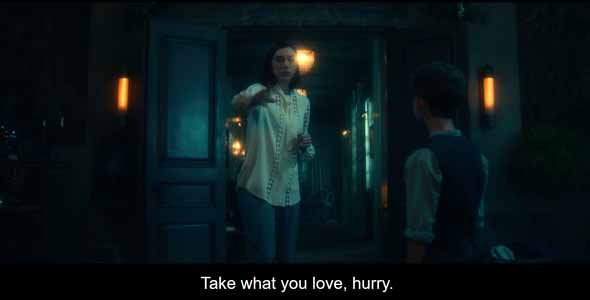 © CBS, Paramount
© CBS, Paramount
Picard's past is ret-conned to include a mentally ill mother and toxic home environment
being the reason he left home for the stars.
But season 2 actually goes back and retcons Picard's entire life in ways that reframe his entire character from TNG. He isn't the consummate explorer who joined Starfleet because of a genuine love of science and discovery. Now, he joined Starfleet to get away from a toxic home environment. It's just like how reboot James Kirk didn't join Starfleet because of a desire to explore, but because he was double-dog-dared to be a better Starfleet officer than his dead dad. But at least in Kirk's case, that is a different character in a different timeline. In Picard's case, we're supposed to believe this is the same Picard that we've known all along.
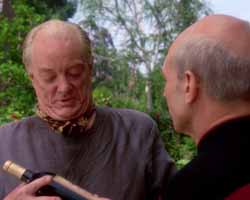 TNG s4 e2 "Family", © CBS, Paramount
TNG s4 e2 "Family", © CBS, Paramount
Where was Robert during all this family drama?
Also, did the writers not know that Picard had an older brother? Where was Robert Picard during all this drama with their parents?
And Seven of Nine has apparently regressed from any of her character development from the previous season, as she's back to mindlessly killing Borg and insisting that they "aren't human anymore". This is despite the fact that both she and Picard are case in point examples of former Borg being rehabilitated, and despite her sorrow of the destruction of the Borg Rehabilitation Project in season 1.
The lynchpin of this season is a young astronaut who suffers from crippling depression. This is despite the fact that NASA has pretty extensive screening and training processes that would either rule out someone who is not emotionally stable enough to do the job, or would train them to the point that they do the job without a second thought. This is an example of how having science and technology consultants in the writing room would help make the story more believable. [More]
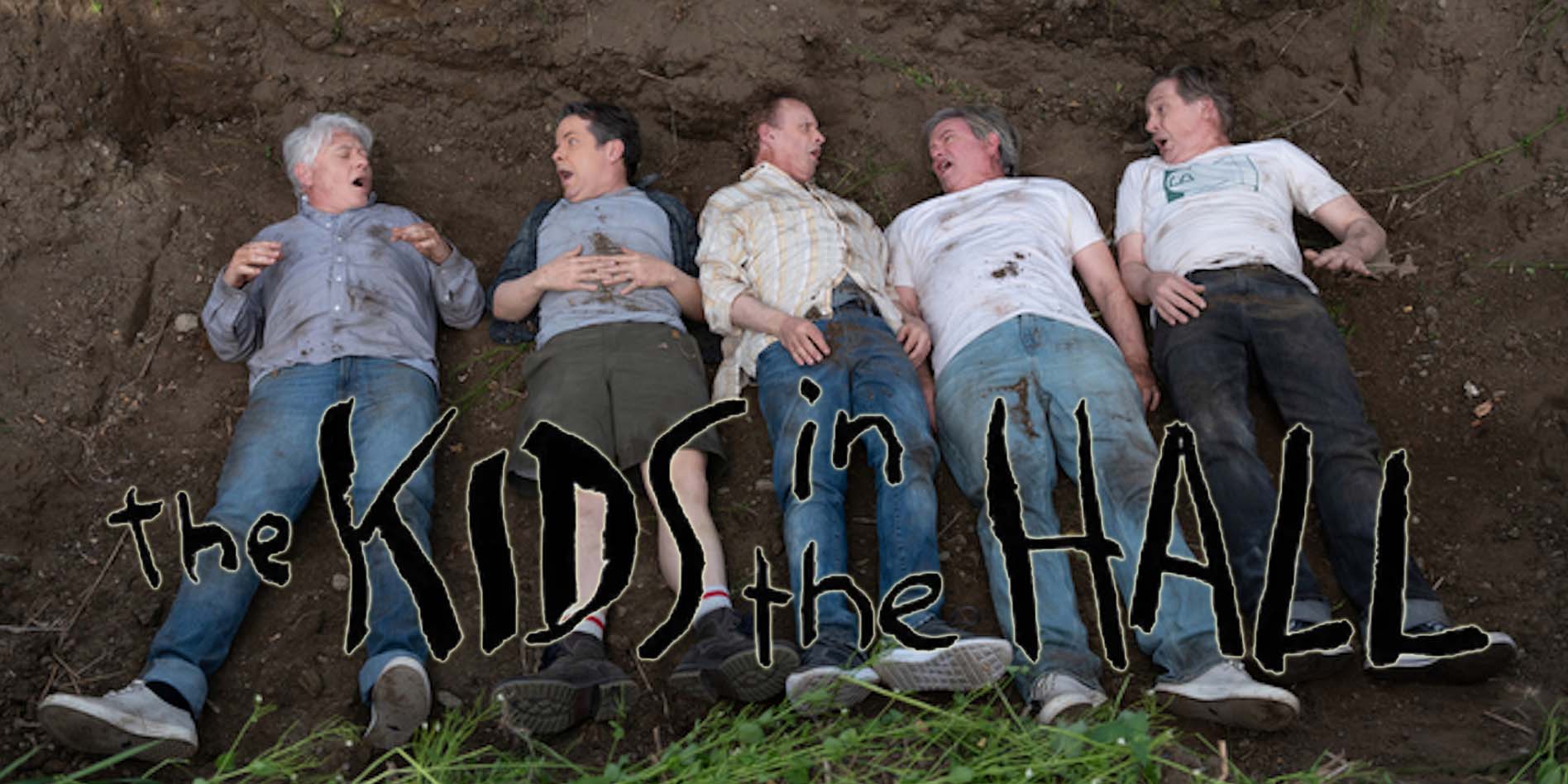
The 80's and 90's nostalgia wave has struck again. This time, it has resurrected the Canadian cult sketch comedy The Kids In The Hall. I love The Kids In The Hall, but if you had asked me if the comedy of the group of 60-year-olds would hold up after 30 years, I would have said that I would be skeptical. At least, that would have been before I saw one of their live acts when they performed in Vegas. To my surprise, it held up! So I was uncharacteristically optimistic about this particular nostalgia reboot.
The group has, after all, continued to perform together all this time. All five members have returned for the Amazon Prime reboot, which is technically being considered the sixth season of the show, which is still being produced by Lorne Michaels, in cooperation with Broadway Video, as if it had never stopped production at all.
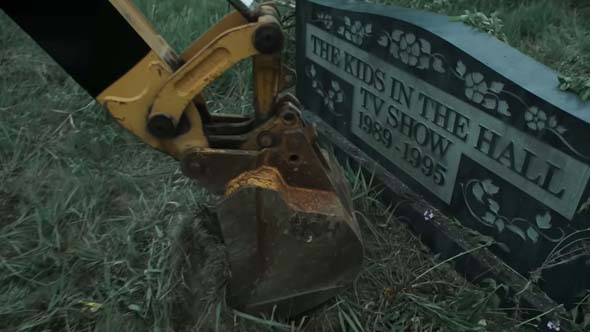 © Amazon
© Amazon
TV and movie studios are still digging up old nostalgia properties from the 80's and 90's.
But the truth is that it had stopped production. For almost 30 years. The kids aren't "kids" anymore. They're all around 60 years old. The humor has shifted to being more about growing old, the changes in culture and technology, and plenty of self-deprecation. The opening skit is a prolonged joke that, after selling a video cassette of Brain Candy (the Kids In The Hall movie from 1996) at a yard sale for a single looney, the movie had finally broken even, thus greenlighting Amazon to literally dig the show up from its grave. This imagery of the backhoe digging up the grave of a dead show from the early 90's is just so perfectly on point and sets the tone for much of the rest of the season. Other sketches from the first season include Cathy and Kathie sending the last ever fax, old businessmen adjusting to having Zoom meetings, and a sad apartment dweller fixating on how things just aren't what they used to be.
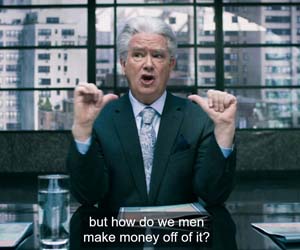 © Amazon
© Amazon
Don Roritor plainly asks
"How do we men make money off of [gender parity]?"
A lot of comedians have been walking on ice for the past few years whenever they joke about race, gender, #MeToo, cancel culture, and so forth. The Kids take on these subjects as well, but manage to do so in their trademark absurdism that somehow manages to make it feel less mean-spirited, less out-of-touch, and less like they are trying to deflect from their own personal guilt. They are sensitive to the issues, but still able to poke fun at them without punching down at any individual or marginalized group. For example, there's a bit about an office worker being fired for "cultural appropriation". And in yet another perfectly on-point bit, Mark McKinney's corporate executive Don Roritor point blank asks a panel of women how white men like him can profit from gender parity, to which the women reply matter-of-factly "you can't. That's the point."
The individual episodes are all kind of hit-or-miss with the individual sketches, as was always common with this show. The absurdism either lands, or it doesn't. But when it does, it lands so smoothly and perfectly that it more than makes up for the misses around it. I think the second episode was the peak of this reboot for me, as it's "drop average" sketch had me almost crying from laughter. This episode also features the Queen of England cutting the ribbon on a monument to Canada's last gloryhole, an adaptation of the "Imaginary girlfriend" sketch from their live show, and ends with a bit about masturbating during Zoom meetings. [More]
5ce158fe-07e4-4e23-be07-d32833791c96|0|.0
Tags:The Kids In the Hall, Dave Foley, Bruce McCulloch, Kevin McDonald, Mark McKinney, Scott Thompson, Paul Bellini, Amazon Prime, comedy, sketch comedy, reboot, nostalgia
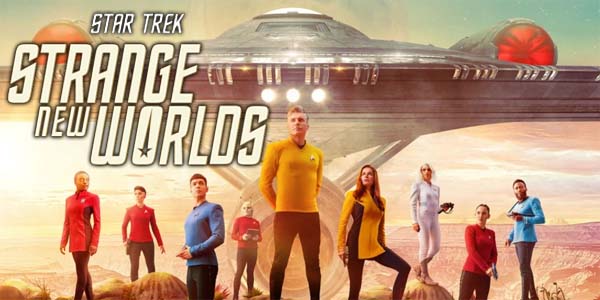
CBS and Paramount are finally learning. After years of trying to force some offensively awful Star Trek down our throats, they've finally given us something palatable. Well, I guess that's not entirely fair. I actually like Lower Decks. But Lower Decks is a self-parody animated comedy, so it's not really "serious" Star Trek, even though it's far more worthy of the franchise than the first season of Discovery or Picard.
Well, now Paramount+ also has a live-action Star Trek show worthy of the name, in the form of Strange New Worlds.
The first episode of Strange New Worlds is much more in-line with what I expect from a Star Trek show. I already talked up the virtues of an episodic format in my Lower Decks review, but focused mostly on how the self-contained nature of episodes allows some to be bad without dragging down the entire season or series with them. But the episodic nature of Lower Decks and Strange New Worlds also highlights another fundamental advantage of the episodic format: those self-contained episodes can tell more high-concept stories.
 © CBS
© CBS
Strange New Worlds is about learning from past mistakes and getting better.
The first episode of Strange New Worlds isn't the most creative or the highest of concept stories, but it's a serviceable story that is true to the spirit of classic Trek, and I'll be spoiling a lot of its plot in the coming paragraph. A first contact goes wrong, and the Enterprise has to be called into rescue the missing crew of a small scout ship. They find a pre-warp civilization that learned to reverse-engineer a warp drive from observing the events of Star Trek: Discovery. Except these people didn't use the technology to build a propulsion device; they're using it to build a weapon that they plan to use to end their own civil war. Realizing that Federation activity has already influenced the cultural development of the planet, Captain Pike decides that General Order One (the non-interference Prime Directive) does not apply. He choses to share the history of Earth's World War III (which this series assumes lies in our real-life immediate future) in an attempt to convince the warring factions to reconcile instead of risk mutual destruction.
Put simply, the first episode of Strange New Worlds differs from Discovery in that it is about preventing a war instead of starting one. It's about learning from the mistakes of past history so that they aren't repeated. And it's a stark warning of what might go wrong in today's society if political tensions don't cool off, without having to depict a future for humanity in which no social progress seems to have happened at all.
It's the type of forward-thinking story that I like about classic Trek, but which is absent from Discovery and especially from Picard (well, the first season anyway). Those shows give us a view of the future in which all the same problems that exist today still exist in 2 or 300 years. Strange New Worlds goes back to depicting a future in which humanity has learned from its past mistakes and improved itself. It's the hopeful, optimistic future that I loved from the older shows. I want to see more modern science fiction depicting futures for its audience to aspire to, instead of all the bleak, dystopian settings that dominate modern sci-fi and makes our future feel hopeless.
[More]
55d95b0e-adc5-437b-b367-2d7d9e457ad6|0|.0
Tags:Star Trek, Star Trek: Strange New Worlds, CBS, Paramount+, USS Enterprise, Christopher Pike, Spock, Nurse Chapel, Uhura, Sam Kirk, science fiction, warp drive, Starfleet, Federation, first contact, Prime Directive, Star Trek: Discovery
I've been sitting out of a lot of movies this past few years due to the COVID pandemic. Even though I'm vaccinated and boosted, I'm just still not comfortable sitting in a crowded theater with a bunch of randos. And if I did go to a movie in a theater, I would wear a mask, and that can get uncomfortable for a whole 2 or 3 hour movie. I could maybe be convinced to go to a theater for a small movie with a mostly-empty theater, but for a big summer blockbuster, I'm just not there yet. So despite being a big Spider-Man fan, and generally having liked the MCU's Spider-Man movies so far, and despite the movie's universal acclaim and praise, I passed on seeing No Way Home in theaters when it released last year. I waited until it finally showed up on streaming, and just now finally got around to watching it this past weekend.
Perhaps the biggest failing of the MCU's Spider-Man movies so far is that none of them have been terribly surprising. Both Homecoming and Far From Home had pretty predictable plots, with the only real surprise being Mysterio's deathbed public reveal of Spider-Man's true identity. No Way Home does not deviate far in terms of predictability. The multiverse aspect and return of villains from the previous movie continuities was in the trailers, and the fact that Tobey Maguire and Andrew Garfield would reprise their roles was one of the worst-kept secrets of any movie ever.
In fact, the only real surprise for me was that this movie did not do the one thing that I really thought that it would do. It doesn't have any new villains -- not even in a bit part. I thought for sure that some new minor villains would show up early in the movie, knowing Spider-Man's identity, and threatening him, May, MJ, and/or Ned, and that would be the impetus for Peter going to Doctor Strange to reset the timeline.
Specifically, I was expecting to see the Scorpion. The end-credits stinger from Homecoming introduced Mac Gargan, who very much wanted to learn Spider-Man's identity from the Vulture. I thought for sure that with Spidey's identity being public, that the opening act of the movie would have J. Jonah Jameson hiring Mac Gargan to become the Scorpion to hunt down Peter Parker and capture or kill him. Peter would defeat Scorpion, but not before Gargan goes too far in threatening Peter's friends and family, leaving Peter with no choice but to go to Strange to help protect the people he loves.
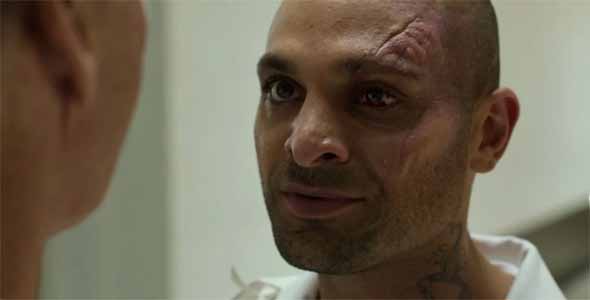 © Sony Pictures, Disney
© Sony Pictures, Disney
I was surprised that the Scorpion did not show up early in this movie to raise the stakes.
This never happens. The impetus for going to Strange is that Peter and his friends aren't accepted into college because the colleges are afraid of the controversy of admitting a known vigilante. It feels like a flimsy excuse for wanting to change the timeline or mind-wipe the entire planet, especially considering that the MCU's Peter has strong connections to Stark Industries, Nick Fury, and the Avengers, and shouldn't have any problem finding ways for him and his friends to have professional lives together.
So I thought the lack of Scorpion was a huge missed opportunity. It would have raised the stakes, provided some act 1 action, and allowed for the inclusion of a new character. It also would have served as a red herring for the movie's trailers by letting Disney show some action scenes with a villain, while trying to keep the rest of the villain roster a secret for as long as possible. Maybe this was part of the original plan, but Marvel axed it after a version of Scorpion showed up in Into the Spider-Verse. Maybe they didn't want to look too similar to Spider-Verse?
[More]
b1a1c296-1668-450a-89fd-289401f75104|0|.0
Tags:Spider-Man, Spider-Man: No Way Home, The Amazing Spider-Man, Marvel, Green Goblin, Doctor Octopus, Electro, Sandman, the Lizard, Scorpion, Mac Gargan, Doctor Strange, Venom, Tom Holland, Tobey Maguire, Andrew Garfield, Willem Dafoe, Alfred Molina, multiverse, one more day
|

| 12 | | | | | | | 60 | | 11 | | | | | | | 55 | | 10 | | | | | | | 50 | | 09 | | | | | | | 45 | | 08 | | | | | | | 40 | | 07 | | | | | | | 35 | | 06 | | | | | | | 30 | | 05 | | | | | | | 25 | | 04 | | | | | | | 20 | | 03 | | | | | | | 15 | | 02 | | | | | | | 10 | | 01 | | | | | | | 05 |
|